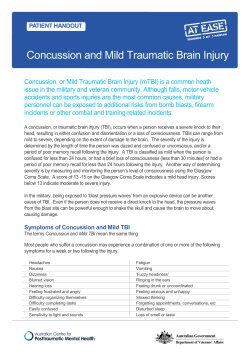
Presentation & Complications of of Traumatic Brain Injury
Presentation & Complications of of Traumatic Brain Injury (TBI) in Khartoum- Sudan Randa Z A M Khair*, Mohamed AR Arbab**, Abdullah AbdelRahman*** *Assistant Professor of Surgery, **Associate Professor of Surgery, ***Associate Professor of Psychiatry; All: Faculty of Medicine, University of Khartoum Abstract: Aims: To study the pattern of presentation & the early post-traumatic neurological and psychiatric complications of traumatic brain injury (TBI). Patients & Methods: This is a descriptive prospective hospital based study. It includes 459 patients who presented to the National Center of Neurological Sciences (NCNS) in Shaab Teaching Hospital in Khartoum- Sudan, with TBI in a period of six months. Questionnaires prepared beforehand were filled for all patients. The collected data were analyzed using the SPSS computer program. The chi-square (χ2) test and the p value were used for statistical significance. Results: TBI was found to affect different age groups from one day to ninety years with a mean age of 27.53+ 16.92 years mainly young adults. Male to Female ratio was 4: 1. Most of them were either of working or studying groups. The most common causes of TBI were Motor Vehicle Accidents 179 (39.0%), followed by assaults 143 (31.2%) and falls 71 (15.5%). The presenting symptoms were mainly loss of consciousness 410 (89.3%). TBI was associated with scalp and face lacerations in 223 (48.6%). The complications encountered were convulsions in 8.2%, limb paresis in 9.0%, psychiatric complications in 20.8% and amnesia in 5.9%. Death was in 17.0%. Conclusion: TBI affects the productive population. It is caused mainly following motor vehicle accidents and presented mainly by variable degree and duration of disturbance of consciousness. Approximately one sixth of patients with TBI developed psychiatric complications and almost similar ratio developed neurological complications. 1
© Copyright 2025
















